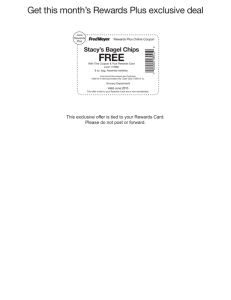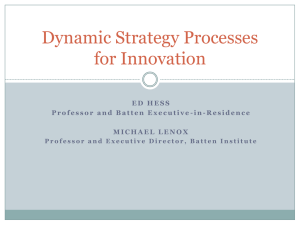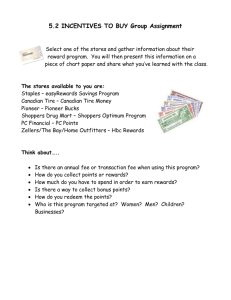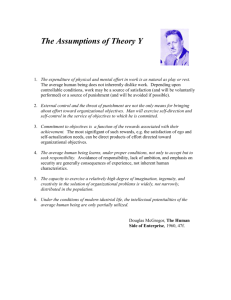Faculty Roles and Rewards Policy
advertisement
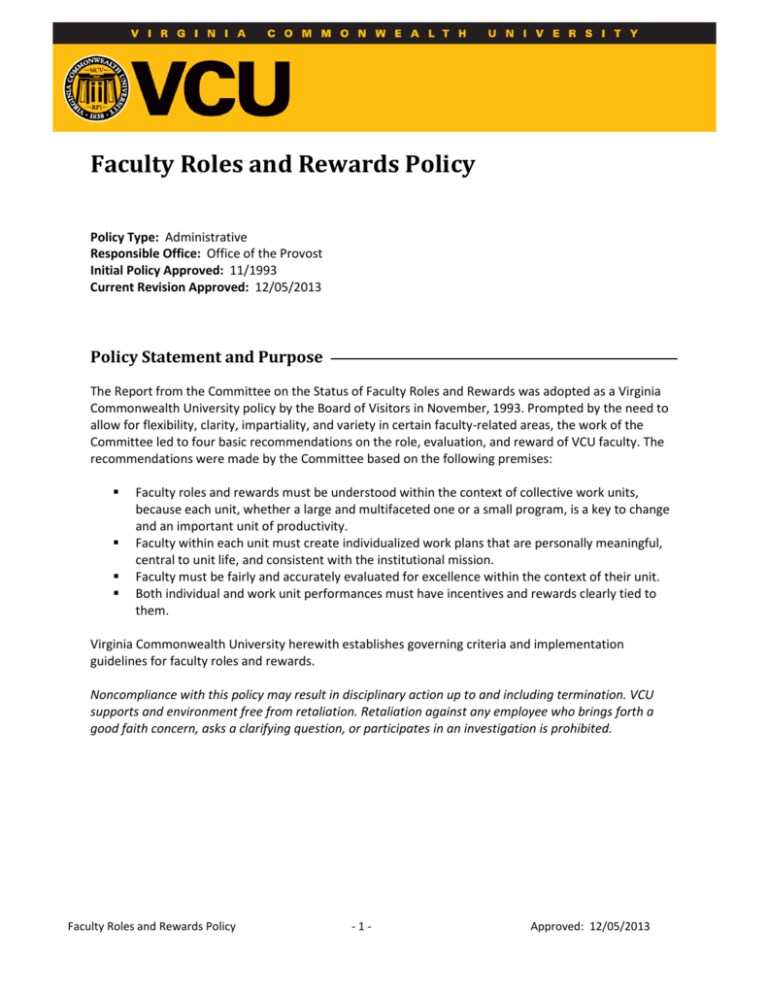
Faculty Roles and Rewards Policy Policy Type: Administrative Responsible Office: Office of the Provost Initial Policy Approved: 11/1993 Current Revision Approved: 12/05/2013 Policy Statement and Purpose The Report from the Committee on the Status of Faculty Roles and Rewards was adopted as a Virginia Commonwealth University policy by the Board of Visitors in November, 1993. Prompted by the need to allow for flexibility, clarity, impartiality, and variety in certain faculty-related areas, the work of the Committee led to four basic recommendations on the role, evaluation, and reward of VCU faculty. The recommendations were made by the Committee based on the following premises: Faculty roles and rewards must be understood within the context of collective work units, because each unit, whether a large and multifaceted one or a small program, is a key to change and an important unit of productivity. Faculty within each unit must create individualized work plans that are personally meaningful, central to unit life, and consistent with the institutional mission. Faculty must be fairly and accurately evaluated for excellence within the context of their unit. Both individual and work unit performances must have incentives and rewards clearly tied to them. Virginia Commonwealth University herewith establishes governing criteria and implementation guidelines for faculty roles and rewards. Noncompliance with this policy may result in disciplinary action up to and including termination. VCU supports and environment free from retaliation. Retaliation against any employee who brings forth a good faith concern, asks a clarifying question, or participates in an investigation is prohibited. Faculty Roles and Rewards Policy -1- Approved: 12/05/2013 Table of Contents Who Should Know This Policy 3 Definitions 3 Contacts 3 Procedures 3 I. System of work unit accountability must become the focus of planning and evaluation……………………………………………………………………………………………3 IA. Governing Criteria……………………………………………………………………………..3 IB. Guidelines for Implementation………………………………………………………….4 II. Faculty works roles must be flexible, keyed to the work unit's mission, and consistent with promotion and tenure criteria…………………………………….4 IA. Governing Criteria……………………………………………………………………………..4 IB. Guidelines for Implementation………………………………………………………….4 III. Standards of excellence must be the basis for evaluation of all faculty and work units………………………………………………………………………………………...5 IA. Governing Criteria…………………………………………………………………………….5 IB. Guidelines for Implementation…………………………………………………………5 IV. The institution must implement a fair and consistent system of merit-based reward……………………………………………………………………………….…6 IA. Governing Criteria…………………………………………………………………………..6,7 IB. Guidelines for Implementation……………………………………………………….6,7 Final Notes…………………………………………………………………………………………………….7 Forms 8 Related Documents 8 Revision History 8 FAQs 8 Faculty Roles and Rewards Policy -2- Approved: 12/05/2013 Who Should Know This Policy • • • • • • Vice Presidents Vice Provosts Deans Department Heads Administrators with personnel responsibilities Faculty Definitions There are no definitions associated with this policy or procedures. Contacts The Office of the Provost officially interprets this policy. The Office of the Provost is responsible for obtaining approval for any revisions as required by the policy Creating and Maintaining Policies and Procedures through the appropriate governance structures. Please direct policy questions to Office of the Vice Provost for Academic and Faculty Affairs. Procedures I. A system of work unit accountability must become the focus of planning and evaluation A. Governing Criteria 1. A relevant work unit is defined as a school, department, interdisciplinary center, or specialized program that shares a collective purpose and a collective responsibility to meet University needs in achieving its mission. 2. Work units serve as the intermediaries between institutional mission and the individual faculty member's disciplinary or interdisciplinary interests. 3. Each work unit includes all faculty, including non-tenure track faculty where relevant, in its system of planning goals and evaluating success. 4. Responsibilities are not the same in every unit; the balance among teaching loads, emphasis on research, and expectations for public service may vary. The differing roles and functions of collective work units, however, must be clearly articulated, so that each can be judged by standards appropriate to it and resources can be properly allocated. Faculty Roles and Rewards Policy -3- Approved: 12/05/2013 B. Guidelines for Implementation 1. Each work unit, with adequate faculty representation, will develop a mission statement and expectations for performance that are consistent with the broader University mission. Unit statements will include institutional goals such as interdisciplinary and collaborative initiatives, interaction with the urban environment, and diversity in students, faculty, and curriculum. 2. Work unit leaders will be held accountable by the next higher level administrator for ensuring adequate faculty involvement in this process and for the congruency of the unit's mission statement and performance expectations with the overall mission of the University. 3. Consistent with the 1984 Board of Visitors' approved policy on annual evaluation, each year faculty, students, and administrators will evaluate work unit leaders--including department chairs, directors, and deans--for leadership, effectiveness, consistency, and fairness. II. Faculty work roles must be flexible, keyed to the work unit's mission, and consistent with promotion and tenure criteria A. Governing Criteria 1. Definition of faculty roles must balance individual aspirations and abilities with the institutional mission and needs, and faculty reward systems must not only recognize individual accomplishments but must also foster institutional goals and values. 2. Given that VCU is a doctoral research university, a threshold of scholarly activity by faculty is required to achieve tenure. University tenure criteria should continue to govern tenure decisions. Various combinations of research, teaching, and service fulfill the University's mission, and these should be recognized and rewarded appropriately, including in promotion to professor. 3. To support a viable roles and rewards system for both individual faculty members and the institution, faculty must articulate individual roles that contribute to their work unit's mission and to that of the University. Individual work plans must be designed to help faculty develop themselves professionally by taking into account their strengths and weaknesses, evolving interests, and changes in their disciplines. However, work plans must be established in a manner such that individual flexibility is mediated by the overall need for teaching, research, and service at the unit and university levels. The result should be a system that encourages a more comprehensive and productive use of faculty interests and abilities and, thereby, benefits the students, the individual faculty member, the work unit, and the University. B. Guidelines for Implementation 1. The University's policy on 'Annual Assessment of Faculty Performance' (1984) requires that all faculty be evaluated in writing every year. As part of that evaluation, each faculty member will develop a written work plan, covering at Faculty Roles and Rewards Policy -4- Approved: 12/05/2013 2. 3. 4. 5. least a year, that will meet individual, unit, and University goals. These plans may utilize a two to three year planning cycle, but with annual review and evaluation of performance. In preparing work plans that meet unit and university goals, care must be taken to see that individuals will be fairly evaluated and rewarded based on the work that they are asked to do by their unit and the University. For tenure- track faculty, this means that goals for work plans will parallel the expectations for faculty as stated in school and University guidelines. To ensure that flexibility for individual faculty career development is sustained, that the various needs of the University are met, and that faculty excellence in a variety of modes is recognized, guidelines for promotion and tenure will be reexamined periodically. Each faculty member's individual work plan will have the written approval of the department chair or other unit head, who is responsible for maintaining an appropriate overall mix of teaching, research, and service for his or her unit. Department chairs, deans, and other unit heads will also develop written plans for their work that cover at least a year and that meet the needs of their units and of the University. These plans will be approved in writing by the next higher unit head. III. Standards of excellence must be the basis for evaluation of all faculty and work units A. Governing Criteria 1. Because the continued success of work units depends on the innovation, dedication, and motivation of individual faculty members, an accurate and fair method of performance evaluation is necessary. 2. Evaluation of a faculty members or work unit's performance in relation to an approved plan must take into consideration not only the faculty member's or work unit's accomplishments but also the weight assigned to the particular activities of the approved work plan. 3. Because criteria for excellence can vary across disciplines, each work unit should identify criteria for excellence in its specific areas of expertise. 4. Criteria for excellence must rely on qualitative as well as quantitative measures of assessment and must contain markers of excellence collectively embraced by the University community. B. Guidelines for Implementation 1. Each work unit will identify the criteria for excellence by which individual faculty performance is assessed. 2. Criteria used will include traditional quantitative measures of assessment such as student evaluations, teaching loads, student outcomes, number of exhibitions, performances and publications, and amount of service activity. 3. Criteria also will include qualitative measures of assessment: a. For teaching, qualitative issues of student learning such as perceived student competence, knowledge, skills and attitudes will be considered as well as course/curriculum impact on the overall learning experience. The Faculty Roles and Rewards Policy -5- Approved: 12/05/2013 diverse nature of faculty work will require that teaching evaluation not only consider platform performance but also, for example, performance in student advising, clinical supervision, thesis supervision, public teaching, the application of instructional technologies, work in pedagogy, and course development. b. For scholarship/creative work, qualitative assessment will consider the appropriateness and the effectiveness of the activities chosen, their originality and degree of innovation, their difficulty in accomplishment, and their overall scope and importance. Because the scholarly activities in an individual work unit are diverse, the definition of appropriate scholarship should be broadened beyond the traditional definition focusing solely on the scholarship of discovery. c. For service, qualitative assessment will consider the impact of the service performed. Again, consistent with the diverse nature of various work units, service missions will extend beyond institutional service to include professional, disciplinary service and community service that draws on the professional expertise of faculty. d. Criteria for unit evaluation will include quantitative measures of assessment such as demand, credit hours produced, student outcomes, and funding raised, as well as qualitative measures such as centrality to the University mission, uniqueness, and competitive standing. IV. The institution must implement a fair and consistent system of merit-based reward A. Governing Criteria 1. The increased emphasis on both scholarly/creative productivity and on accountability to the broader University mission underscores the importance of implementing an appropriate and equitable reward system. 2. Although it is generally agreed that the attraction of an academic life lies in many scholarly and personal rewards that transcend simple monetary compensation, it also is understood that faculty members who carry out effectively the University's mission must be justly compensated for their efforts. 3. The institution must maintain as one of its highest priorities a commitment to achieving faculty salary levels that are competitive with its benchmark institutions. 4. In order to encourage excellence in teaching, research, and service, an equitable and adequate reward structure must exist. There must be better utilization of resources available if excellent accomplishments by individual faculty members and by work units as a whole are to be encouraged and rewarded. Therefore, it is necessary to provide both salary and non-salary incentives for faculty and nonsalary rewards to work units. 5. Accordingly, two strategies are necessary: a. Base salaries, increases, and salary supplements must be maximized within the University. Faculty Roles and Rewards Policy -6- Approved: 12/05/2013 Guidelines for Implementation The University will strive to achieve the State Council of Higher Education for Virginia's (SCHEV) goal for faculty salaries. The University will periodically review and adjust raises for promotion in rank so as to be consistent with benchmark institutions. The University will identify a permanent fund of money to allow for base-salary increases for extraordinary individual merit. The University will revise existing policies and procedures to support and supplement faculty salaries whenever possible via mechanisms including but not limited to grants, contracts, consulting, and commercialization. The University will strive to identify a fund of money to endow limited term, or rotating chairs of excellence in teaching, research, and service that will result in increased work flexibility and compensation for a limited period. b. Non-salary rewards must be expanded. Guidelines for Implementation The University administrators, deans, and appropriate directors will provide a range of non-salary related rewards in their respective work units for faculty who have earned recognition through significant achievement. The University will develop a fund of money to reward collective work units for meritorious performance. Deans will implement revised study research leave policies, as established by the University's salary administration guidelines, including leave of one semester with full pay. Work units will pursue more imaginative ways for supporting faculty development such as course banking and course and service reductions. Faculty development will include working to improve teaching or service as well as engaging in traditional scholarly/creative work. Each school will establish awards to recognize excellence in teaching, scholarship/creative work, and service. The institution will expand the University awards programs to include recognition of faculty in the early stages of their careers. The institution, and relevant work units within it, will develop a system of rewards and recognition for adjunct and term faculty. Final Notes: The purpose of the Faculty Roles and Rewards Policy is to create a balanced roles and rewards system based on the premise that flexibility and accountability for faculty and their work units are all integrally related. Implementing and maintaining this policy in annual operation will be the responsibility of the Provost in conjunction with the Council of Deans. The President of the Faculty Senate and the Chair of the Faculty Caucus, working in conjunction with their representative bodies, will review these actions to Faculty Roles and Rewards Policy -7- Approved: 12/05/2013 ensure that the policy is implemented and that it is carried out annually. Forms There are no forms associated with this policy and procedures. Related Documents 1. Annual Assessment of Faculty Performance http://www.assurance.vcu.edu/Policy%20Library/Annual%20Assessment%20of%20Faculty%20P erformance.pdf 2. Faculty Handbook http://www.assurance.vcu.edu/Policy%20Library/Faculty%20Handbook.pdf 3. Faculty Promotion and Tenure Policies and Procedures http://www.assurance.vcu.edu/Policy%20Library/Faculty%20Promotion%20and%20Ten ure%20Policies%20and%20Procedures.pdf 4. Study-Research Leave Policy http://www.assurance.vcu.edu/Policy%20Library/Study%20Research%20Leave.pdf 5. Faculty Bonus Award Policy http://www.assurance.vcu.edu/Policy%20Library/Faculty%20Bonus%20Award%20Policy .pdf 6. State Council of Higher Education Faculty Awards http://www.schev.edu/adminfaculty/OFAprogramindex.asp 7. Southern Association of Colleges and Schools, Commission on Colleges standards on faculty evaluation and faculty development http://www.sacscoc.org/ Revision History This policy supersedes the following archived policies: Approval: November 1993 Faculty Roles and Rewards Policy Current Revision: December 5, 2013 Faculty Roles and Rewards Policy FAQs There are no FAQs associated with this policy and procedures. Faculty Roles and Rewards Policy -8- Approved: 12/05/2013
